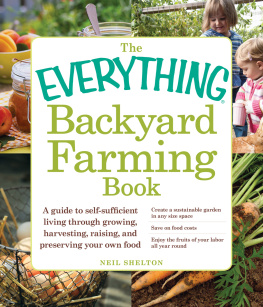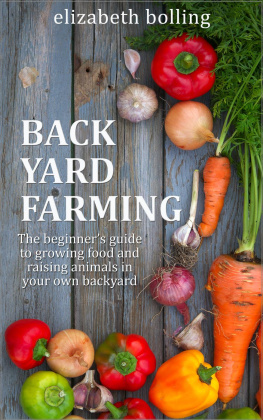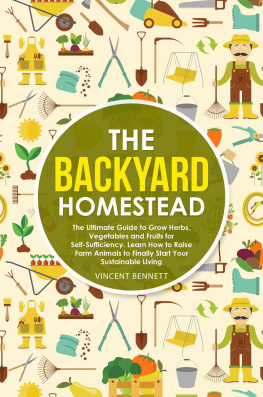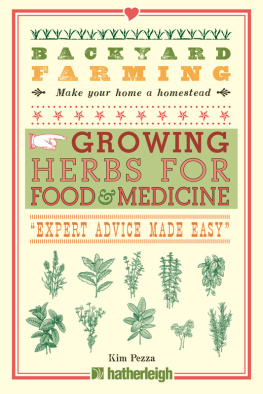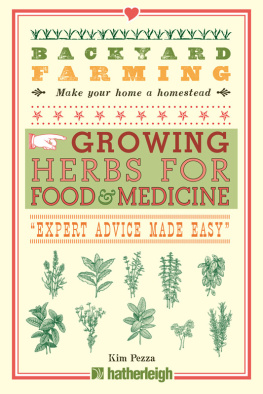THE

BACKYARD
FARMING
BOOK
A guide to self-sufficient living through growing, harvesting, raising, and preserving your own food
Neil Shelton

Avon, Massachusetts
To my wife, my sister, and my mother. You have always stood by me.
Contents
The Top Ten Reasons to Become a Backyard Farmer
- To provide a reliable source of healthy and nutritious food
- To create personal and family income
- To maintain a connection to the natural world
- To secure a sustainable lifestyle
- To protect the environment
- To protect yourself from financial crisis
- To protect yourself from hidden allergens in processed foods
- To teach your children to be less dependent on materialistic goods
- To adopt a more physically healthy lifestyle
- To achieve an inner sense of accomplishment and satisfaction
Introduction
At first, the idea of backyard farming may seem like a virtual impossibility. To the twenty-first-century mind, the word farming conjures up thoughts of mammoth tractors and endless rows of soybeans, corn, or wheat as far as the eye can seenot the small patch of grass behind the typical home. However, this is a relatively modern concept of farming, quite unlike what the term has meant throughout history.
Traditionally, the goal of the farmer has been to produce an ample supply of food for himself or his family with enough left to trade for the things that he couldnt grow himself, not to fill enormous silos with grain to be sold around the globe. Viewed in this context, the idea of backyard farming is not only possible, its a traditional, worldwide norm that almost anyone can follow, almost anywhere, and for almost no cost.
There has been a resurgence of backyard farming in modern America in recent years, and like every new trend, a burgeoning crowd of merchants has sprung up to offer the would-be farmer a variety of high-priced products. From complicated plastic compost tumblers to pricey, ready-made chicken coops seemingly designed more for Barbie and Ken than for actual poultry, these manufacturers are trying to convince farmers they need things they dont.
Let there be no mistake: Backyard farming is first and foremost a way to save money, offer a safe, chemical-free diet, and boost the family income. You actually can practice genuine farming in a small amount of space and, because its not just another silly fad, learning to farm will provide you with a basic sense of security about your financial well-being and a greater understanding of the world you live in, as well as countless indelible lessons about nature.
The intended purpose of this book is to help you become a farmer right now, with little or no experience, and with resources that you probably already possess or can easily obtain. Farming, youll find, is as close to alchemy as you may ever hope to achieve, because the farmer creates the ultimate value of nourishment from the most basic and common elements.
Once you finish this book, youll feel ready to walk out into your backyard and begin farming right then and there. You may choose to buy a few things along the way, but by and large, you can obtain the basic items youll need either for free or for next to nothing.
Thats not to say that there isnt a good deal of work involved, and you shouldnt get the idea that everything will turn out exactly the way you plan it right from the start. Farming is a discipline that requires constant adjustment as your knowledge increases and conditions change. Some of your crops will fail, while others will astound you with the bounty you can harvest from just a few square feet. Some of your livestock will die or disappoint you, and other animals will seem like pets, even part of the family. Small-scale agriculture requires a healthy amount of physical effort, and while your health and well-being will benefit, youll pay for these gains, and for your good nights sleep, with sore muscles and sunburned shoulders. However, every farming year will be different.
This book may actually teach you a bit more than you need to know to make a good start, but on the other hand, youll never learn as much about farming as youll want to know. Youll see the unkind side of nature and be frustrated by the weather, but youll beam with joy at the brilliant redness and tangy flavor of your first tomato, and marvel at the wonder of that first egg that appears in the nest-box. In time, you will not only have gained a different definition for the word farming, but youll also view the term prosperity from a new viewpoint as well.
CHAPTER 1
Backyard-Farming Basics
Farming began about 10,000 years ago, when early man first discovered that crop cultivation was a much more reliable way to feed himself and his family than hunting and gathering. During the early part of the twentieth century as tractors began to replace horses and men, the number of farms, and farmers, began to decline. Today, amid stunning technological advances, many people are seeking a return to the self-sufficiency and independence of the farming lifestyle.
The Origins of Small Farming
Five thousand years before the pyramids were built, some early human noticed that in places where grains had been spilled in the dirt the year before, new shoots of that same grain grew in lush abundance. That discovery, and the subsequent decision to spill some grains on purposethat is, to plant themwould result in a more bountiful, more independent existence for all of humankind. A millennium or so later, man began to domesticate farm animals, leading to a lifestyle that permitted him to stay and prosper in one place instead of following a nomadic lifestyle that relied more on luck and strength than planning and forethought.
Thus began civilization as these first small farmers enjoyed a greater bounty of crops and sources of protein that they didnt have to fight for. Farmers could not only provide food for themselves and their families, but they could provide an excess that could be traded to neighbors for other goods.

It is believed that the first farmer was probably a woman, because women were the primary gatherers in ancient hunting-and-gathering societies, and were therefore more attentive to, and familiar with, the growing habits of plants. The first cultivated crops were probably figs.
Modern-Day Farmers
Today, 50 percent of all food is produced on the largest 2 percent of all farms. These factory farms have less in common with the farms of your grandparents or great-grandparents than those small independent operations had with the Stone Age cultivators. Many jokes are made about modern children who think that milk comes from a convenience store and dinner comes from a drive-up window, but in fact, the modern food supply is becoming less and less distinguishable from factory-made products every day.
At the same time, the number of farms worldwide continues to shrink as traditional farmers are replaced by giant corporations following the agribusiness mantra from the postWWII era: Get big or get out. In a world of large corporations, it seems that if youre not willing or able to go into six- or seven-figure debt for equipment, seed, and chemicals, theres no room in agribusiness for you.

